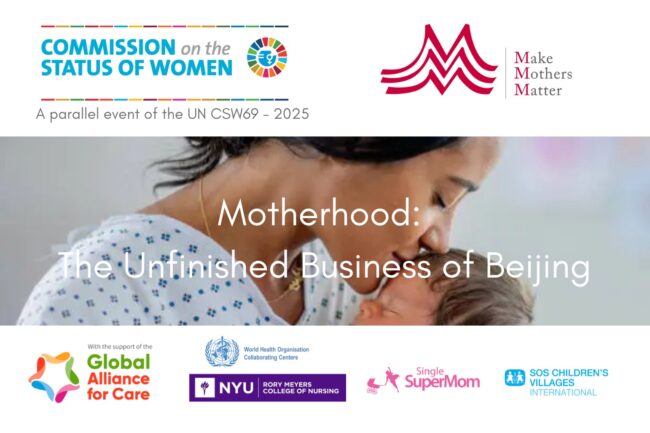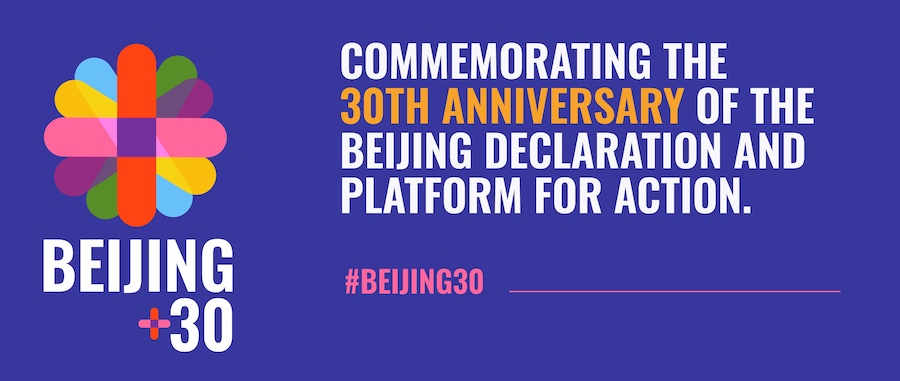Motherhood: The Unfinished Business of Beijing
09.03.25
UN New York - The Beijing Declaration and Platform for Action (1995) is a landmark global policy document focused on advancing gender equality and women's rights, and is considered one of the most comprehensive and progressive blueprints for gender equality worldwide. It was adopted by 189 countries at the Fourth World Conference on Women held in Beijing, China in 1995. 30 years later, the 69th UN Commission on the Status of Women will review its implementation - Beijing+30.

Join our New York Team and partner organisations for an in-person CSW69 event in New York, that will highlight the criticality of supporting motherhood for gender equality and global development, explore the progress and challenges in fulfilling the Beijing+30 commitments to mothers, and discuss possible mechanisms for change going forward.
🗓️ Thursday, March 20, 10:30am – 12pm (NY Time)
📍 United Nations Church Center, 10th Floor | 777 United Nations Plaza, New York
✅ Register for the event with MMM here and with Whova here (both required)
Background information
In contrast with other women-focused policy efforts and commitments around the world, the Beijing Declaration and Platform for Action explicitly calls for the recognition and support of mothers. The Platform for Action references “mothers” and “motherhood” seventeen times across fourteen different clauses, underscoring their critical role in society. It highlights a wide range of issues affecting mothers — from recognising the profound impact of motherhood on families and communities to emphasising the importance of maternal health, education, and empowerment. The document also advocates for equal career opportunities and economic independence, reinforcing the need to support mothers in every sphere of life.
Paragraph 29 is specifically dedicated to highlighting the importance of women’s role as mothers and carers, and care as a shared responsibility across all of society: ‘The social significance of maternity, motherhood and the role of parents in the family and in the upbringing of children should be acknowledged. The upbringing of children requires shared responsibility of parents, women and men and society as a whole. Maternity, motherhood, parenting and the role of women in procreation must not be a basis for discrimination nor restrict the full participation of women in society.’
While presumably, some of the 189 countries in the declaration have made advancements in these action commitments for mothers, no organisation is monitoring and reporting progress at a global level. Motherhood is one of the least discussed areas of gender equality and sustainable development. This 30-year review of the Beijing declaration and platform for action present a timely opportunity to spotlight the power of motherhood in global development, the lack of societal and policy support for motherhood, and some mechanisms of change going forward.
Objectives
- To reinvigorate the discussion around motherhood as engine of global development and gender equality
- To explore the progress and challenges in fulfilling Beijing +30 motherhood-specific commitments
- To collectively envision a way forward that includes identifying mechanisms and actions for progress.
Speakers
- Donna Cill, Associate Professor and Deputy Director, World Health Organization Collaborating Center at NYU College of Nursing
- Isra Lee, Founder and Director, Single SuperMom
- Ana Moreno, Technical Secretary, Global Alliance for Care
- Sofia Garcia Garcia, Head of Strategic Partnerships and External Engagement, SOS Children’s Villages International
- Farah Arabe, Representative to the UN in New York, Make Mothers Matter (Moderator)

This event will be held on the margins of the 69th Commission on the Status of Women, which will take place 10-21 March 2025 at the UN headquarters in New York. Its main focus will be on the review and appraisal of the implementation of the Beijing Declaration and Platform for Action and the outcomes of the 23rd special session of the General Assembly. The review will include an assessment of current challenges that affect the implementation of the Platform for Action and the achievement of gender equality and the empowerment of women and its contribution towards the full realisation of the 2030 Agenda for Sustainable Development.
See also:
→ MMM’s written statement to the Commission on the same topic
The New EU Gender Equality Roadmap : A Call for Inclusion of Mothers
04.03.25
The European Commission’s initiative on a new Gender Equality Roadmap post-2025, marks a significant step forward in addressing gender disparities across the European Union. Make Mothers Matter (MMM
Breaking the Cycle: Gender Equality as a Path to Better Mental Health
18.03.25
The Council of the European Union has taken a decisive step in recognising the vital connection between gender equality and mental health.
Europe Must Listen to Mothers: Our landmark report heads to the European Parliament
28.08.25
On 22 September 2025, the voices of mothers will take centre stage in Brussels. For the first time, Make Mothers Matter (MMM) will present its State of Motherhood in Europe








